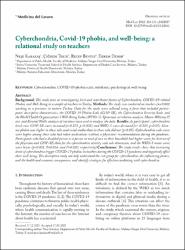| dc.contributor.author | Karakaş, Neşe | |
| dc.contributor.author | Tekin, Çiğdem | |
| dc.contributor.author | Bentli, Recep | |
| dc.contributor.author | Demir, Ekrem | |
| dc.date.accessioned | 2022-07-20T07:35:16Z | |
| dc.date.available | 2022-07-20T07:35:16Z | |
| dc.date.issued | 2022 | en_US |
| dc.identifier.citation | Karakaş, N., Tekin, Ç., Bentli, R., & Demir, E. (2022). Cyberchondria, Covid-19 phobia, and well-being: a relational study on teachers. La Medicina del Lavoro, 113(3) | en_US |
| dc.identifier.issn | 0025-7818 | en_US |
| dc.identifier.uri | https://doi.org/10.23749/mdl.v113i3.1266 | |
| dc.identifier.uri | https://hdl.handle.net/20.500.12899/1159 | |
| dc.description | Neşe Karakaş, Department of Public Health, Faculty of Medicine, Malatya Turgut Ozal University, Malatya, Turkey
Çiğdem Tekin, Inönü University, Vocational School of Health Services, Department of Health Care Services, Malatya, Turkey
Recep Bentli, Malatya Provincial Health Directorate, Malatya, Turkey
Ekrem Demir, Malatya National Education Directorate, Malatya, Turkey | en_US |
| dc.description | Received 17.12.2021. Accepted 17.05.2022 | en_US |
| dc.description.abstract | Background: This study aims at investigating level and contributor factors of Cyberchondria, COVID-19-related Phobia, and Well-Being in a sample of teachers in Turkey. Methods: The study was conducted on teachers (n=1000) working in a province in eastern Turkey. Data for the study were collected using a form that included particitest, and Kruskal Wallis analysis of variance were used to analyze the data. Results: As participant's cyberchondria levels rose, C19P-SE scores increased (r=0.271, p<0.001), and WHO-5 scores decreased (r=-0.224, p<0.05). Corona-phobia was higher in those who used social media than in those who did not (p<0.05). Cyberchondria scale scores were higher among those who had taken medications without a physician's recommendation during the pandemic. Participants who had a disabled person or a person in need of care in their household had higher scores for distrust of the physician and C19P-SE than for the cyberchondria severity scale sub-dimension, and the WHO-5 mean scores were lower (p<0.001, P=0.016, and P=0.020, respectively).Conclusions: The study results show that increasing levels of cyberchondria trigger COVID-19 phobias in teachers during the COVID-19 pandemic and negatively affect their well-being. This descriptive study can help understand the risk group for cyberchondria, the influencing factors, and the health and economic consequences, and identify strategies for effective combating with cyberchondria. | en_US |
| dc.language.iso | en | en_US |
| dc.publisher | Mattioli1885 | en_US |
| dc.relation.ispartof | La Medicina del lavoro | en_US |
| dc.rights | info:eu-repo/semantics/openAccess | en_US |
| dc.subject | Cyberchondria | en_US |
| dc.subject | COVID-19 phobia scale | en_US |
| dc.subject | İnfodemic | en_US |
| dc.subject | Psychological well-being | en_US |
| dc.title | Cyberchondria, Covid-19 phobia, and well-being: a relational study on teachers | en_US |
| dc.type | Article | en_US |
| dc.authorid | 0000-0003-0737-0541 | en_US |
| dc.department | MTÖ Üniversitesi, Tıp Fakültesi, Dahili Tıp Bilimleri Bölümü | en_US |
| dc.institutionauthor | Karakaş, Neşe | |
| dc.identifier.doi | 10.23749/mdl.v113i3.1266 | |
| dc.identifier.volume | 113 | en_US |
| dc.identifier.issue | 3 | en_US |
| dc.identifier.startpage | 1 | en_US |
| dc.identifier.endpage | 9 | en_US |
| dc.relation.publicationcategory | Makale - Uluslararası Hakemli Dergi - Kurum Öğretim Elemanı | en_US |
| dc.identifier.pmid | 35766648 | |
| dc.identifier.scopus | 2-s2.0-85133214703 | en_US |
| dc.identifier.scopusquality | Q3 | en_US |
| dc.identifier.wos | WOS:000820993900005 | en_US |
| dc.identifier.wosquality | Q3 | en_US |
| dc.indekslendigikaynak | Web of Science | en_US |
| dc.indekslendigikaynak | Scopus | en_US |
| dc.indekslendigikaynak | PubMed | en_US |


















